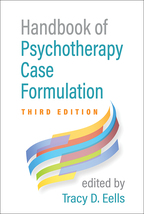Handbook of Psychotherapy Case Formulation
Third Edition
Edited by Tracy D. Eells
HardcoverPaperbacke-bookprint + e-book
Hardcover
orderMarch 23, 2022
ISBN 9781462549009
Price: $102.00 498 Pages
Size: 6⅛" x 9¼"
Paperback
orderApril 22, 2022
ISBN 9781462548996
Price: $68.00 498 Pages
Size: 6⅛" x 9¼"
e-book
orderJanuary 15, 2022
PDF and Accessible ePub ?
Price: $68.00 498 Pages
ePub is Global Certified Accessible
print + e-book $136.00 $81.60
orderPaperback + e-Book (PDF and Accessible ePub) ?
Price: 498 Pages
ePub is Global Certified Accessible
“Any practicing clinician knows that there is more to conducting therapy than following a manual. Yet the growing availability of treatment manuals over the past several decades has led many training programs to pay relatively less attention to individualized case formulation. Fortunately, Eells and his contributors recognize the crucial importance of case formulation in planning personalized interventions for transdiagnostic problems. The third edition of this book continues to provide a notable contribution to the field with its detailed account of how case formulation may add to the effectiveness of therapeutic intervention.”

—Marvin R. Goldfried, PhD, Distinguished Professor, Department of Psychology, Stony Brook University
“Case formulation allows therapists to know when and how to use their clinical skills and how to evaluate whether clients have benefited. The up-to-date third edition of this excellent resource helps practitioners from all different orientations learn how to construct and use case formulations. Doctoral students and experienced clinicians alike should read this book so they can respond more effectively to the needs of their clients. It is user friendly and easy to read.”

—Clara E. Hill, PhD, Department of Psychology, University of Maryland, College Park
“Case formulation is the invisible force that guides psychotherapy—without a sound formulation, treatment is likely to be unfocused and of limited benefit. Developing a case formulation and using it to guide treatment is a skill needed by all psychotherapists, regardless of their theoretical orientation or psychotherapy style. In the third edition of this comprehensive handbook, Eells brings together other leaders in the field to approach case formulation from an array of perspectives, resulting in an effective integration of theory, evidence, and clinical practice.”

—Bruce E. Wampold, PhD, ABPP, Department of Counseling Psychology (Emeritus), University of Wisconsin–Madison
“This handbook is built on the cornerstones of evidence-based practice: theory, practice wisdom, the person of the client, and research. Each chapter lays out ways that clinicians can methodically engage clients while building hypotheses for treatment planning. Students and practicing clinicians can improve their practice processes and outcomes after reading this vital practice text.”

—Jemel P. Aguilar, PhD, Department of Social Work, Southern Connecticut State University
—Marvin R. Goldfried, PhD, Distinguished Professor, Department of Psychology, Stony Brook University
“Case formulation allows therapists to know when and how to use their clinical skills and how to evaluate whether clients have benefited. The up-to-date third edition of this excellent resource helps practitioners from all different orientations learn how to construct and use case formulations. Doctoral students and experienced clinicians alike should read this book so they can respond more effectively to the needs of their clients. It is user friendly and easy to read.”
—Clara E. Hill, PhD, Department of Psychology, University of Maryland, College Park
“Case formulation is the invisible force that guides psychotherapy—without a sound formulation, treatment is likely to be unfocused and of limited benefit. Developing a case formulation and using it to guide treatment is a skill needed by all psychotherapists, regardless of their theoretical orientation or psychotherapy style. In the third edition of this comprehensive handbook, Eells brings together other leaders in the field to approach case formulation from an array of perspectives, resulting in an effective integration of theory, evidence, and clinical practice.”
—Bruce E. Wampold, PhD, ABPP, Department of Counseling Psychology (Emeritus), University of Wisconsin–Madison
“This handbook is built on the cornerstones of evidence-based practice: theory, practice wisdom, the person of the client, and research. Each chapter lays out ways that clinicians can methodically engage clients while building hypotheses for treatment planning. Students and practicing clinicians can improve their practice processes and outcomes after reading this vital practice text.”
—Jemel P. Aguilar, PhD, Department of Social Work, Southern Connecticut State University



